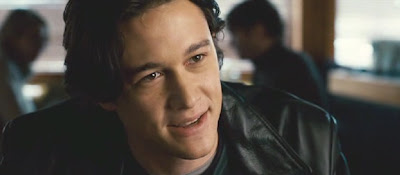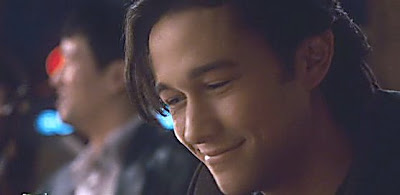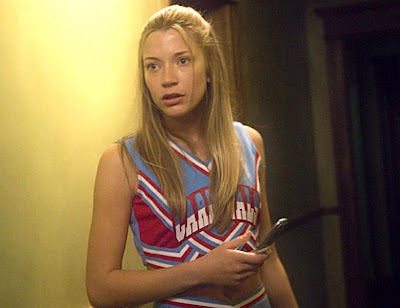 AVC: "The character also feels this lingering shame about his responsibility in causing the accident.
AVC: "The character also feels this lingering shame about his responsibility in causing the accident.JGL: That's true. And I think that Chris suffers from that more than he suffers from the brain injury. And that's something we can all identify with, whether you've been hit in the head or not. You know what it's like to be ashamed of yourself, to regret something. And those are powerful feelings, and they can tear your life apart. And I think that they are tearing Chris apart even more so than the scratches on his brain." Source: Avclub/content
"The Lookout" has a strangely purposeful way of tipping its narrative "surprises".
Pratt, for instance, takes a menial job swabbing floors as the lone overnight employee at a rural bank. This is a situation that an unscrupulous person could exploit, and when just such a shady character (Matthew Goode) befriends Pratt, "The Lookout" immediately tips us that he's up to no good.
This studied series of anticlimaxes (a variation of the technique
 in "Zodiac") handled better may be Frank's way of saying the movie isn't really about twists and turns, but people.
in "Zodiac") handled better may be Frank's way of saying the movie isn't really about twists and turns, but people.But so was the livelier "Memento," since its final twist revealed the ghastly truth about its lead character, played with sardonic intelligence by Guy Pearce."
Source: Philly.com/dailynews

 Fisher plays Luvlee with a sweetness that nicely contrasts against the usual femme fatale archetype, while the most memorable supporting performance comes from Goode, oozing riveting menace and persuasive charm as the heavy". Source: Newyork.metromix.com
Fisher plays Luvlee with a sweetness that nicely contrasts against the usual femme fatale archetype, while the most memorable supporting performance comes from Goode, oozing riveting menace and persuasive charm as the heavy". Source: Newyork.metromix.com
"Gary eventually clues Chris in on his plan to rob the bank after the bank receives an influx of cash from the winter harvest. Gary promises Chris a cut of the heist’s proceeds and a shot at normalcy with Luvlee. Chris agrees to become the lookout for the heist. But Gary isn’t to be trusted, Chris begins to have second thoughts, Lewis suspects something is amiss, and the winter harvest money is due to arrive any day now.
normalcy with Luvlee. Chris agrees to become the lookout for the heist. But Gary isn’t to be trusted, Chris begins to have second thoughts, Lewis suspects something is amiss, and the winter harvest money is due to arrive any day now.
 the law, to a femme fatale who seduces the hero with the promise of intimacy, to the build up and execution of the heist, double-crosses, and voice over narration, it’s obvious we’re firmly in noir world". Source: Sfstation.com
the law, to a femme fatale who seduces the hero with the promise of intimacy, to the build up and execution of the heist, double-crosses, and voice over narration, it’s obvious we’re firmly in noir world". Source: Sfstation.com
"Frank wrote the screenplay for “The Lookout” almost 4 years ago, and it has long been rumored, like Lem Dobb’s still unproduced “Edward Ford”, to be one of the greatest unfilmed scripts on the studio shelves.  David Fincher toyed with it a bit before chasing the “Zodiac” instead and left it for Frank to direct himself. Frank acquits himself very effectively in the director’s chair, but this isn’t so much a director’s picture as it is a true “auteur” film, as in “author”.
David Fincher toyed with it a bit before chasing the “Zodiac” instead and left it for Frank to direct himself. Frank acquits himself very effectively in the director’s chair, but this isn’t so much a director’s picture as it is a true “auteur” film, as in “author”.
The film’s effectiveness is entirely within the pages of the script, and the talent of its fine cast. Like John Huston, who debuted with his own crime adaptation,  “The Maltese Falcon”, Frank clearly sees writing and casting as the most important parts of making a successful film. Huston once remarked that 75% of a picture’s success could be attributed to good casting. If the material is any good, the director merely has to photograph it cleanly." Source: Beyondhollywood.com
“The Maltese Falcon”, Frank clearly sees writing and casting as the most important parts of making a successful film. Huston once remarked that 75% of a picture’s success could be attributed to good casting. If the material is any good, the director merely has to photograph it cleanly." Source: Beyondhollywood.com

"In the old-school noir pictures that The Lookout nods to —such as "Black Angel" and "Somewhere in the Night" —the heroes needed to remember what they did to get to the end of their stories; 
"Scott Frank's "The Lookout" makes atmospheric use of the wide spaces at its outskirts and surrounding farms to tell a compellingly neo-noir tale of an unusual recruit in a bank robbery. Film noir may have been born in an urban world (Los Angeles, perhaps, with a few childhood visits to San Francisco and New York) and defined by the look of a labyrinth of seedy bars, dark alleys, mansions in the hills, crowded lunch counters and broad sidewalks, but modern noir is just as likely to be found in Midwestern suburbs as in your pick of America's big, bad cities." from Source: http://blogs.indiewire.com
"I’ve been ripping through the pulp noir of Charlie Huston recently, so I slipped comfortably into "Get Shorty" screenwriter Scott Frank’s directorial debut -a dark neo-noir about Chris
Jeffrey M. Anderson: "I was curious about the restaurant that Lewis wants to open with Chris, "Lew's Your Lunch." Does everybody have a secret dream of opening a restaurant?
 Andrew O'Hehir: "And it seems like you hit on the idea that one of the main things that manifests for Chris is that he gets angry when he's not able to do something the way that the so-called normal part of him would want to. Was that one of the key things for you?
Andrew O'Hehir: "And it seems like you hit on the idea that one of the main things that manifests for Chris is that he gets angry when he's not able to do something the way that the so-called normal part of him would want to. Was that one of the key things for you?

MY LAST VIDEOCLIP OF "THE LOOKOUT" _________________





















 So which of these two actresses, Megan Fox or Kirsten Dunst, is most likely to lose more friends and alienate people in the movie?
So which of these two actresses, Megan Fox or Kirsten Dunst, is most likely to lose more friends and alienate people in the movie? 

















.jpg)
.jpg)












